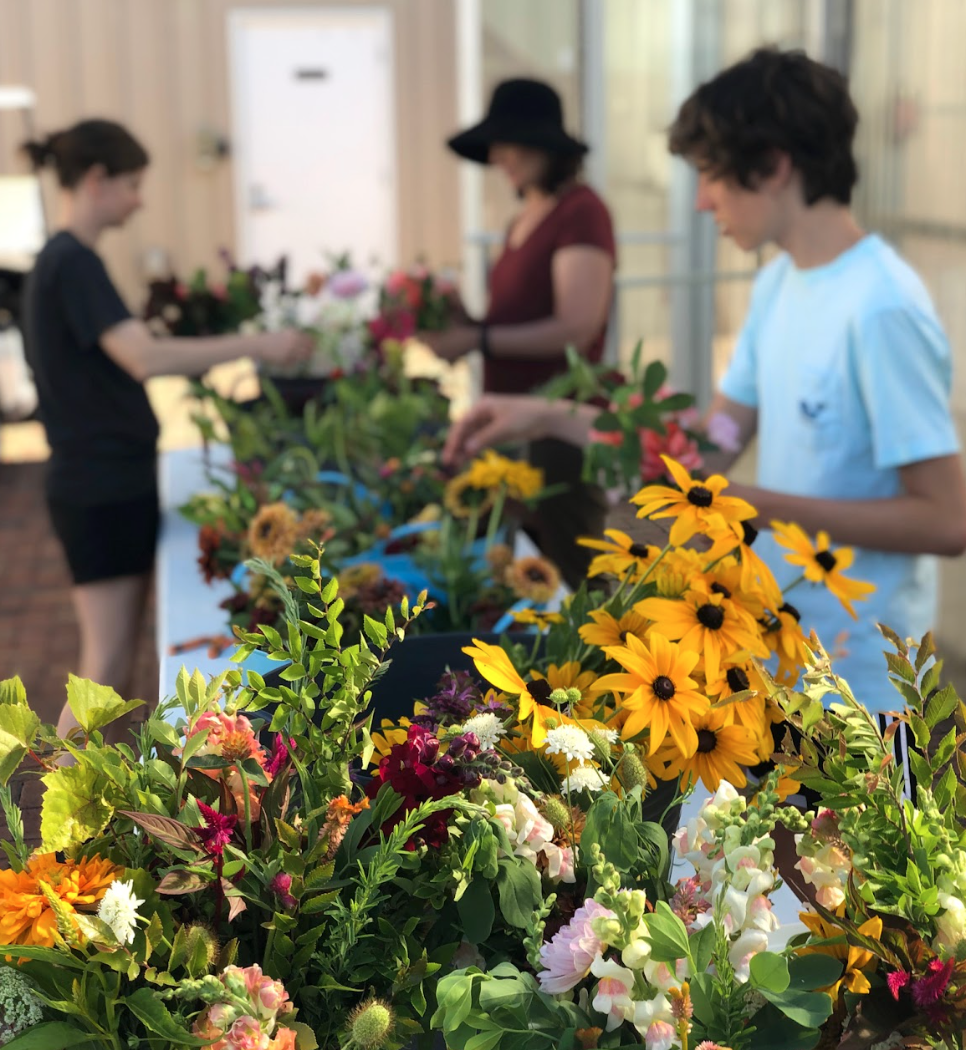
A MINISTRY TOOL KIT FOR CHURCHES
Caring for Creation

O heavenly Father, you have filled the world with beauty: Open our eyes to behold your gracious hand in all your works; that, rejoicing in your whole creation, we may learn to serve you with gladness; for the sake of him through whom all things were made, your Son Jesus Christ our Lord. Amen. (Collect “For Joy in God’s Creation” from BCP)
What would it look like for churches to enable Creation’s ecological glory to flourish in immense beauty, drawing people to the Creator of all that extravagant life?
Imagine parishes so in love with the created world that stewarding earth’s resources became an expression of adoration for their Savior, through whom all Creation was made, instead of an onerous chore.

VISION
What if parishes felt that their duty to be a “sign, instrument, and foretaste” to the Kingdom of God (Rev. Lesslie Newbigin) included caring for the ecosystems that surround their parish, understanding that the care of the poor and the earth are inseparable?
Our vision is that Anglican parishes would have an all-of-Creation pro-life vision, equipping their laity to do the rewarding work of fostering ecological life on a planet that has lost 73% of its wildlife since 1970. We envision parishes seeing it as part of their duty as Kingdom people to preserve as much life as possible while Creation is suffering under Satan’s attack. We want to empower Anglicans to do this work in the power of the Holy Spirit, knowing they serve a God who is fully sovereign and promises to make a “new heavens and a new earth.” Therefore, we long for Anglicans to do this creation care work as an expression of love for our human and non-human neighbors while we wait for Jesus’s return–and not because we think we can “save the planet” in our own power or by our own means.
We long for parishes to deeply understand the connections between caring for the earth and caring for the poor, for it is the poor who suffer most from pollution, ecological destruction, desertification of land, and climate change. We hope to empower parishes to do this creation justice work for both creation and the marginalized in their own local communities: doing little things with great love. We hope that much of this work will also involve growing food for marginalized communities, since farming and gardening are one of the best ways to form a loving relationship with God’s created world and experiencing its fertility.
DATA & STATS
2024 was the hottest year on record
73% decline in the average size of monitored wildlife populations
"The earth is the Lord’s, and all that is in it, the world, and those who live in it; for he has founded it on the seas, and established it on the rivers." Psalm 24:1-2

Pray. Discern. Is God calling you to create a team or initiative to focus on creation care as a small group or a church?
Learn. Where are there opportunities to intentionally steward creation resources in your church? In your community? Read some of the ideas and books below. Sit down and have coffee with someone with a gardening, forestry, or environmental background.
Gather. Invite a small group of people who are passionate about creating sustainable initiatives and projects within your church and community.
Plan. Think through the details. Who will play what roles? When and where will you meet? What will your focus be?
Launch. Kick off your first initiative. Start small, dream big. Be amazed when God shows up!
Think Sustainable. What are doable, ongoing efforts and projects that volunteers can do on a regular basis that have a significant impact without depleting resources in the process?
How to Do It
GET OTHERS INVOLVED
A church transformed a neglected patch of land into a thriving community garden. Church members and neighbors planted vegetables, shared the harvest with a local food pantry, and taught children about God’s creation.
Volunteers from another church adopted a nearby stream, organizing a monthly cleanup to remove litter and debris. They also worked with local environmental groups to plant native grasses and trees along the banks to prevent erosion and improve water quality.
Another church hosted an e-waste recycling event, inviting members and neighbors to drop off old electronics. Partnering with a certified recycling facility, they safely disposed of items while educating participants on responsible consumption.
A church in a smaller community encouraged members to bike or walk to Sunday services during the warmer months. They installed bike racks and hosted a workshop on bike safety and maintenance.
Lausanne Global
Classroom: Creation
Environmental Justice Statistics
University of Michigan
All of Life (4 Part Series)
A Rocha USA
Living Planet Report
WWF
52 Ways to Care
For Creation
New Garden Farm
From Church of the Redeemer
"Almighty God, who hast made the earth and all that is therein, and hast given unto men dominion over it: Grant that we may be faithful stewards of thy bounty, and not destroy nor waste that which thou hast given us; but through wise use and good stewardship, may we honor thee and benefit those who come after us, through Jesus Christ our Lord. Amen." (BCP 1979, p. 828)

-
Pages 652-654 in BCP
-
-
Green Anglicans
Season of Creation liturgical materials -
Season of Creation
Ecumenical resources to empower Christians during Season of Creation -
BIBLE STUDY & PRAYERS
TIPS & ADVICE
-
Eliminate Single-Use Plastics: Transition from disposable plates, cutlery, and water bottles to reusable or compostable alternatives.
Encourage Recycling: Set up clearly labeled recycling bins throughout the church and educate members on proper usage.
Compost Food Waste: Partner with a local composting service or start an on-site compost bin for food scraps from church events.
-
Switch to Energy-Efficient Lighting: Replace traditional bulbs with LEDs and encourage the use of natural light when possible.
Use Smart Thermostats: Optimize heating and cooling systems to reduce energy usage when the building is not in use.
Conduct an Energy Audit: Identify areas where the church building could improve energy efficiency and implement changes, such as improved insulation.
-
Host a Clothes or Item Swap: Organize events where members can exchange gently used items rather than purchasing new ones.
Support Sustainable Vendors: Source food, supplies, and event materials from local and environmentally conscious businesses.
Reduce Paper Usage: Transition to digital bulletins, newsletters, and event invitations to minimize paper waste.tem description
-
Lena Van Wyk, founder of the Anglican Ministry New Garden Farm, encourages parishes who have a longing to create an ecological haven on their property, but who don’t have a lot of capacity or land, to try planting a ‘Holy Hedgerow.’
Hedgerows were an ancient fixture of land stewardship in England, where a living fence was created between fields to keep livestock in, but also created amazing wildlife corridors and sources of abundant native plant life, for both human and non-human consumption (like berries, rosehips, medicinals, firewood, etc). Hedgerows are easy to establish on native soils with native plants and can be allowed to grow into a wild mix that is aesthetically contained by just hedge trimming, and therefore requires very little maintenance after the first few years of weeding out invasive plants.
With pollinators, birds, and small mammals so endangered, a hedgerow on your church property can be a small but potent way of providing habitat. For a guide on what natives to plant in your area, see this guide from the Xerces Society and this native plant resource guide from the Homegrown National Park.
We encourage you to plant 30-50 types of plants, which can often be purchased very affordably from nurseries that supply the DOT in your state (call the DOT and ask where they source plants or look at this buying guide for local nurseries).
The planting and planning can also be a great opportunity to educate on native plants and native ecosystems with your parishioners, and to include children. Planting plants like native berries, native elderberries, and native roses can be a great way of having a stock of plants to harvest with children as well. If you include native evergreens and native hollies, you can harvest the hedgerow for Advent and Christmastide decorating. Shrubbery pruning can turn into fodder for a great parish bonfire. The possibilities are endless.
-
The Sixth Sunday of Easter is traditionally known as “Rogation Sunday” and the following three days are known as “Rogation Days.” The name comes from the latin word “rogare” which means “to ask,” and signifies the three days of fasting and prayer to ask God’s blessing on agriculture and industry, on the land and crops that grow within, and on the farmers who produce food and care for the earth.
Though these days are signified in our prayer book and liturgical calendar, many are unfamiliar with them. Rogation processions date back to the 5th century, when St Mamertus of Vienne, France developed processional liturgies to pray for God’s blessing and protection over the land by walking through the fields themselves. There had been natural disasters in the land, causing suffering among the people. When the land suffers, people suffer. Jesus tells us in John 16 to pray and ask, and we will receive. Rogation Days take Jesus’ words seriously. Over time, Rogation processions became a time of festival and celebration.
Many of us feel far removed from the rural, agricultural societies that our ancestors knew so well. Before modern cities and highways existed, the whole community surrounding a church was called the parish. The Rogation procession was a tradition of annually marking the boundary of the parish, neighbors walking side by side and reconciling differences (and land disputes), praying for the very particular land in which they lived and worshiped. This happened in springtime, months before harvest, reminding the people of their need for God’s blessing before the seeds could grow into plants, herbs, and flowers. If the land didn’t produce food, people went hungry. It’s common to thank God for the abundant harvest at the end of the season, but Rogation Days teach us to ask and depend upon God when seeds go into the ground and to trust him to provide for our needs.
These days of fasting precede the feast of the Ascension, in which we remember Jesus ascending in his human body back to the Father in heaven. Incarnate Jesus– the Word who brought creation into being– interacted with creation throughout his whole life on earth, and has promised to return and restore it. Rogation Days call us to participate in the work of redemption that creation is waiting for (Romans 8:28). We are invited to see the sacred beauty of God beyond the walls of our church buildings, within the good earth God has made and continues to sustain. We do this in the very communities God has put us in, worshiping, walking, and waiting together for the blessing of God.
Create your own Rogation Procession liturgy, including songs, scripture readings, and prayers over your land, city, industry, and community.
The Book of Common Prayer: pages 613 (Sunday Collect), 635 (Collects of Rogation Days). Read more -
A Rocha UK has tips for individuals, families, small groups, and churches found here.
"The Lord God took the man and put him in the garden of Eden to till it and keep it." Genesis 2:15

-
Consider finding a local community garden, adopt a plot to grow in, and encourage a team within your congregation to tend to it. You might produce flowers for your altar or to give to the infirm. You might grow food to share with neighbors.
Additionally, you grow plants in outdoor containers and window boxes. There are health benefits to having plants in your building, not to mention the therapeutic and educational benefits of gardening. Bringing the life of plants into your space reminds us that all life needs tending to grow and thrive.
-
You can learn which agricultural “zone” you live in online, like on this Plant Hardiness Map produced by the U.S. Department of Agriculture. This will help you determine what types of plants to grow, and what time of year to grow those plants. Zone numbers are typically listed with the descriptions of plants in seed catalogs.
A native species is a plant that’s specifically adapted to your region, so it is suited to handle your climate, terrain, and weather. For example, plants native to the Southwest thrive in sandy soil, hot summers, and drought conditions, whereas plants native to the East Coast grow in heavy clay soils, survive the four seasons, and stand up to hurricane winds.
You can find recommended native plants by state using the Lady Bird Johnson Wildflower Center’s search tool.
-
Consider adopting a street to clean up litter regularly. Think about the place you live in and what it means to take care of it.
Pay attention to food waste with your church events. Invite people to bring their own to-go containers to potlucks or events with food, or think of someone who would be blessed by the remaining food from an event. Take the extra few minutes to pack it up instead of throwing it away.
Use less plastic in your events with food. Have your clean up crew take the extra minutes to wash silverware instead of using plastic cutlery.
Find simple ways to use less energy – turn off lights in rooms that aren’t being used.
-
As followers of Christ, our call to care for creation is not about politics—it is about faithfulness. Scripture teaches that ‘The earth is the Lord’s, and everything in it’ (Psalm 24:1), and God entrusted us to be good stewards of His creation (Genesis 2:15).
Regardless of differing views on environmental issues, our commitment to creation care is an act of gratitude, love for our neighbors, and responsibility to future generations. We seek to approach this topic with humility and unity, focusing on how we can honor God by caring wisely for the world He has given us."
-
The best way to inspire interest in creation care is to connect it to what people already value—faith, family, and community.
Show how caring for God’s creation is an act of worship, a way to love our neighbors (Mark 12:31), and a means of protecting the beauty and resources that future generations will need. Share personal stories, practical steps, and Scripture that highlight our role as stewards of God’s earth.
Rather than focusing on guilt or fear, emphasize the joy and blessing of caring for creation together as an expression of our faith in action."
FAQ’S

Organizations to Engage

Books to Read
Note: The links are to a used book seller for the purpose of recycling books and reducing waste
Stewards of Eden by Sandra Richter
Making Peace with the Land by Fred Bahnson and Norman Wirzba
Art of the Commonplace by Wendell Berry
Watershed Discipleship by Ched Myers
The Marvelous Pigness of Pigs by Joel Salatin
Sabbath as Resistance by Walter Brueggemann
Scripture, Culture, and Agriculture by Ellen Davis
The God of the Garden by Andrew Peterson
Reforesting Faith by Matthew Sleeth
Place, Ecology and the Sacred by Michael Northcott
Subversive Sabbath by A.J. Swobada
Introducing Evangelical Ecotheology by A.J. Swoboda
Agrarian Spirit by Norman Wirzba
Food and Faith by Norman Wirzba
Creation Care and the Gospel by Colin Bell and Robert White
Rooted in Wonder by Eryn Lynum
Need more help? Have a suggestion for this tool kit?
We’d love to connect with you!
Send us an email and someone from our team will get back to you!









































